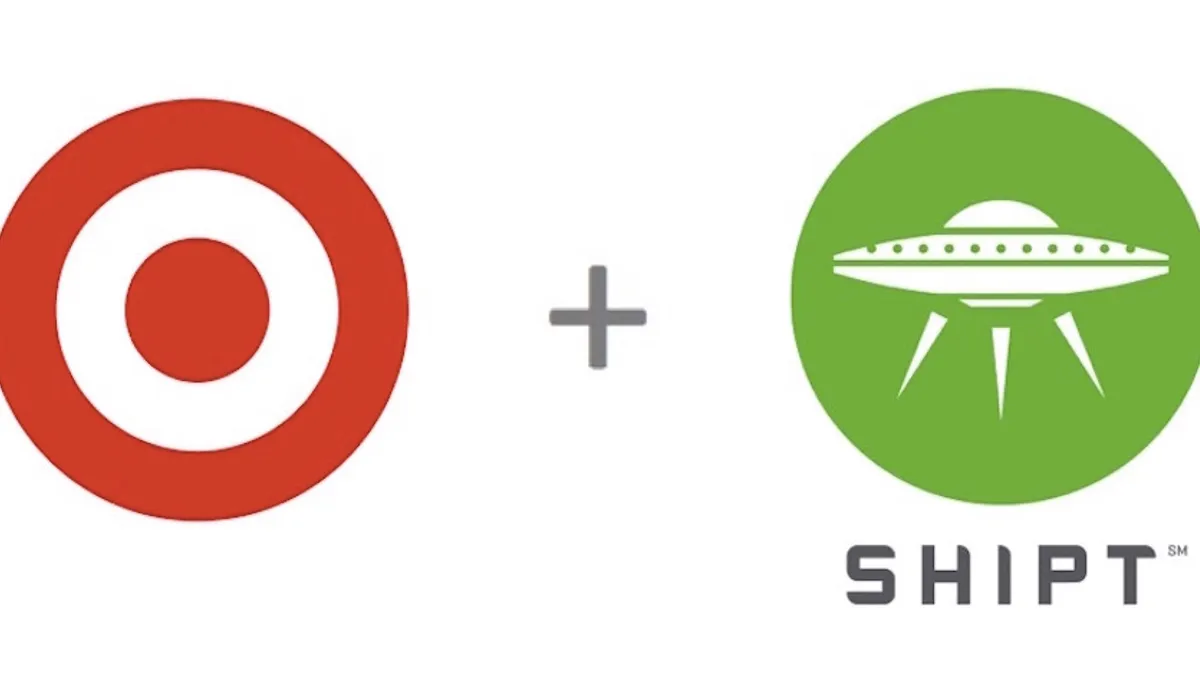Dive Brief:
- Target announced it will acquire e-commerce service Shipt for $550 million, according to a company release.
- The retailer will offer same-day delivery of groceries along with home goods, electronics and other products at half of its stores by early next year. By the 2018 holiday season, Target plans to offer delivery fulfillment from all of its 1,834 U.S. stores.
- Shipt will continue to operate as a standalone business operating out of its Birmingham and San Francisco offices, according to Target, and will look to maintain its current partnerships with retailers while looking to expand into new ones.
Dive Insight:
With its Shipt purchase, Target took a big step forward in the same-day delivery battle that gained momentum following Amazon’s acquisition of Whole Foods.
The deal helps Target address Amazon’s looming threat, which has yet to fully materialize beyond some price cuts of popular items at Whole Foods stores. It also leapfrogs Target ahead of competitors Walmart and Kroger on store fulfillment. Those two retailers have focused mainly on click-and-collect, with hundreds of stores now having the pickup service, but offering only limited delivery options.
Up to this point, the Minneapolis-based retailer’s grocery fulfillment operations have trailed the rest of the industry. Target has gradually expanded its Restock program, which offers next-day delivery on household and grocery essentials, and is seen as a competing service to Amazon Prime Pantry. In October, Target expanded its click-and-collect pilot to around 50 Minneapolis stores, and at a lower Manhattan store in partnership with startup Grand Junction, which Target acquired in August.
“This is currently a segment where Target underperforms — a position that is not sustainable given the increasing popularity of buying food online,” Neil Saunders, managing director of GlobalData Retail, wrote in comments emailed to Food Dive.
Target’s grocery operations, which have lagged behind the company's other divisions, could get a shot in the arm from expanded same-day delivery. Target certainly isn’t happy with its grocery performance. It’s made some key hires this year, and has developed new store formats that highlight fresh produce, snacks and prepared foods.
What’s also interesting — and potentially complicating — about this deal is Shipt’s partnerships with other retailers.
Diana Sheehan, director of retail insights with Kantar Retail, believes Target now has a revenue generator on its hands. Along with Instacart, Shipt has rapidly increased its market expansion this year as retailers eager to blunt Amazon’s incursion have sought partnerships with e-commerce services. Shipt has doubled its market penetration from last year, and currently operates in 70 markets. It hopes to double that total again in 2018.
But will retailers such as Meijer and H-E-B, which have deepened their involvement with Shipt in recent months, be willing to work with a service that’s owned by a close competitor? Sheehan has her doubts.
“The interesting question will be, how does this acquisition impact Shipt’s current partners? I don’t see Meijer, who very effectively competes against Target, Walmart and Amazon today, wanting to continue a relationship with Shipt while supporting Target’s bottom line,” she wrote in an email to Food Dive.
Working closely with a competitor on e-commerce isn’t unprecedented. Sprouts Farmers Market offers delivery through Amazon Prime Now — though that partnership began before the e-tailer acquired competitor Whole Foods. In a recent interview with Food Dive, CEO Amin Maredia maintained the relationship remains strong and could even expand in the near future.
Ultimately, industry observers see Target’s growth in grocery fulfillment as a much-needed move that makes it more competitive in a growing and very dynamic channel.
“[Target] has longed struggled in this category, but seems to be turning the corner,” Michelle Grant, head of retailing with research firm Euromonitor International, wrote in comments emailed to Food Dive. “Its 3rd quarter results showed an increase in comparable sales for food and beverage, especially in areas it has invested: fresh, organics, in-stocks and labor. Having an ‘instant’ delivery option, whether it's click and collect or hyperlocal, is table stakes now for grocers.”









